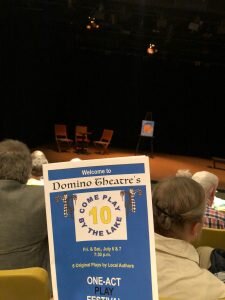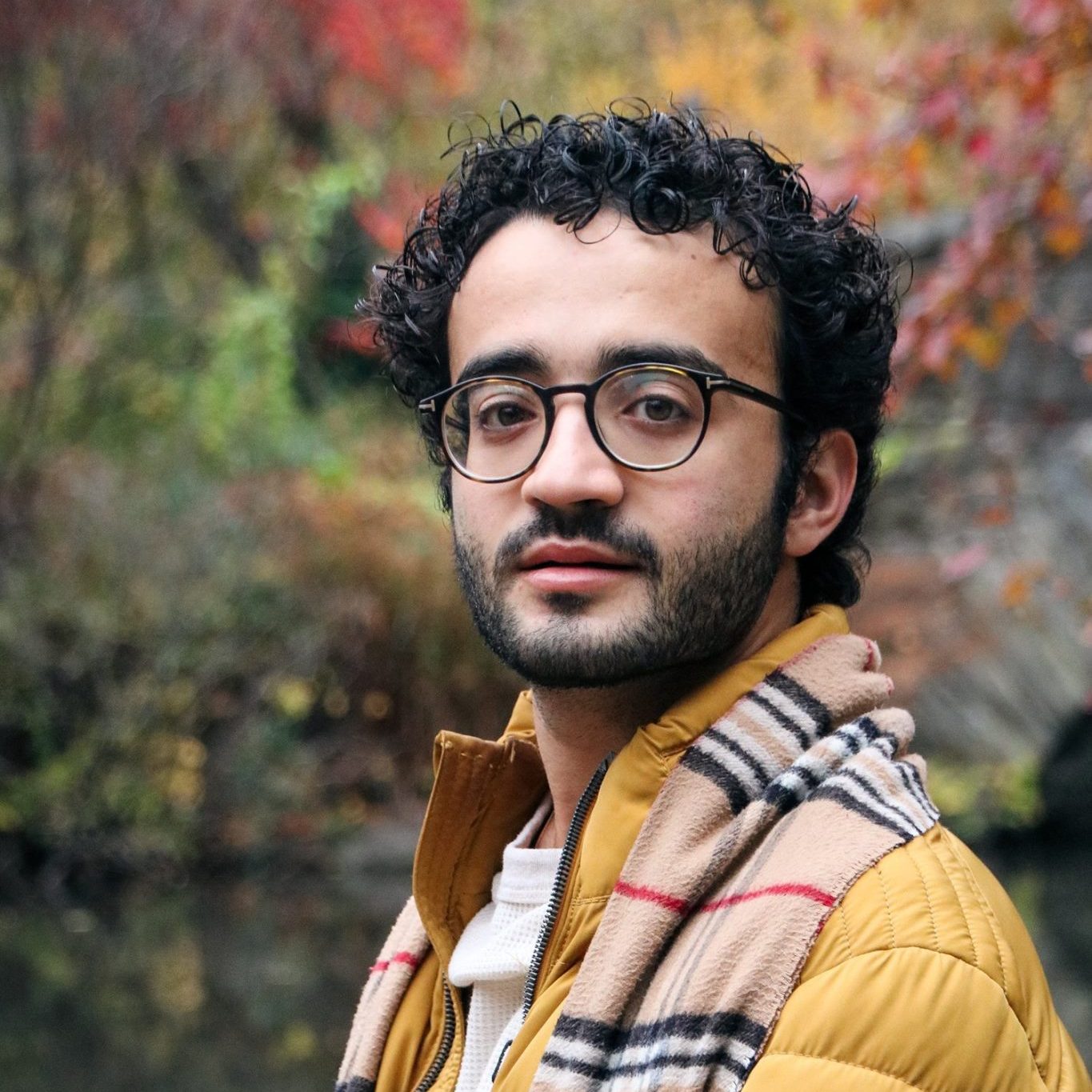Domino Theatre’s 1-Act Festival Promoted Community Theatre in Every Sense of the Term
On July 6 & 7, Kingston’s Domino Theatre assembled community theatregoers and lovers for back-to-back evenings of showcasing exclusively local content at their annual One-Act Play Festival. In the festival, there were 6 one-act plays (3 per night) that played to a full house on each night. The winning play of the festival is granted the Ken Weston Award for Best Original Script, and the opportunity to represent Domino Theatre at the Eastern Ontario Drama League (EODL) One-Act Festival that is to occur this November 9-11 at Domino Theatre.
To deliberate and decide on the winner, Domino enlisted 3 judges, each one of them equipped with the knowledge and expertise to rise up to the task. The panel included Greg Burliuk – retired reviewer for the Kingston Whig Standard, Lily Baird – Past President of the EODL and past EODL representative to Theatre Ontario, and William Morrow – faculty member in the Religions Department at Queen’s University and Past President of the Board of Domino Theatre. The judges’ decision was also partially facilitated by a ballot that was filled out by all audience members who saw all 6 plays, and voted on their most preferred.
The 6 plays that were showcased were collected via a submission process that started in February and could be considered reflection plays, meaning that each one centered around a character, or pair/group of characters, sitting and talking about stories or events that had occurred over the course of their lives.
On the Friday night, the audience was treated to plays titled The Circle by Andy Palmer, The Stranger by RJ Downes, and The Worst Thing You Ever Did by Tony Houghton.

In the first, 2 ex-lovers – Elizabeth and Philip – run into each other and begin to rekindle their relationship after 46 years apart. In an extended scene at a coffee shop, the audience learns what each of these people had done with their respective lives in those 46 years apart, and soon start to develop affection for these characters and support the rekindling of their relationship. Then, suddenly, Elizabeth gets cancer and passes away, all while Philip is away visiting friends on the west coast. The audience also meets Elizabeth’s daughter Sandra, who is discovered to be Philip’s daughter – unbeknownst to both Philip and Sandra – while attending Elizabeth’s funeral. The play ends with a hopeful indication that Philip and Sandra will start to form a strong father-daughter relationship in light of this new information.
Next, The Stranger begins with a character directly addressing the audience, positing the question, “What if you were taken from your life? Removed as though you were never there. Would it matter to anyone?” The following action of the play showed Sandra, a distressed woman and recent alleged victim of kidnap, speaking to the local authorities about the situation. Her kidnapper is also on stage with her, but seemed to be invisible to everyone besides Sandra, which made much more sense once the audience discovers that he, as well as her mother Susan who arrives later on, are figments of her imagination. The play explores themes of helplessness and the pointlessness of life when living without passion or drive, and finishes with Jack, Sandra’s wife and the character who appeared to posit the initial question, taking Sandra safely home with him.
Finally, The Worst Thing You Ever Did laid the foundation for what could have been a hilarious and insightful absurdist play. Two characters, Marcus and Helen, are imprisoned on undefined charges. The lawyer soon joins them onstage, stating that they are in jail for the worst thing they have ever done. He adds that they will not be able to leave the shared cell until they admit to these undefined wrongdoings. From here, Marcus and Helen begin to share with each other, bit by bit, the worst things they have ever done so that by the end of the play, the audience has all the details. Finally, the judge comes into the cell, informs Marcus and Helen that they have been recorded for the entire duration of their conversation, and rules that 1 of them must die. This play explores themes of shame and guilt, and ends unfinished with a gun in one of the character’s hands.
On Night 2 of the festival, the 3 plays presented were titled Grandpa, Tales of his Grandchildren by Harry Jordan, Rescues by Sara Beck, and Writing Romance by Lyn McCauley.
Grandpa, Tales of his Grandchildren was not so much a play as it was a sweet and endearing collection of stories that author and star actor Harry Jordan published into 2 books for his grandchildren, titled “The Adventures of Grandpa and Liam” and “Madison and Friends: The World is their Playground”. From acting out tales of fishing to playing games, this was a theatrical look into one man’s life in the form of a bartender confessional. Then, the audience learns that this grandfather is actually dead, and the play ends with his grown grandchildren eulogizing him.
Rescues was a dual-narrative play. The primary story followed Dez, a recent dog rescuer, in her encounters with various fellow dog owners at a local dog park. The secondary narrative was centered around the relationship between a Miss Anderson and her hospital nurse Molly. At first, the two narratives don’t seem to connect. However, when the audience learns that this play is actually a conceptual exploration of polyamory and its effects on human romantic relationships through character testimonials, it becomes clearer that Miss Anderson was to be metaphorically be one of the dogs of which the characters are the owners.
Last but not least, Writing Romance was a hearty parody of romance novels, and was played out through 2 women – Carolyn and Tess – who were writing romance novels of their own. The standout feature of this play was the addition of a pair of actors included to play the characters in their romance novels. Much humour came from watching this pair act out the scenes in the book, especially the raunchier ones. Although there was not much plot development, there occurred a substantial character transformation in Carolyn once she discovered that in order to write a good romance novel, she first needed to do some “research” in what makes a perfect intimate scene. The laughter that could be heard from the audience was uproarious and infectious.
Besides content, the programming and space itself seemed to perfectly uphold the values that makes a truly wonderful community theatre. There is no better way to appreciate and value community theatre than to have members of community create and produce all of it. Everything was local, from the playwrights to the actors and the production team, which made the work produced feel much closer to home. This closeness was also evident in the atmosphere created by Domino. The theatre created a warm and welcoming atmosphere from the moment patrons walked in the door, and the audience seemed to be filled with people who are eager theatregoers who all know, and loved to see one another.
Beyond atmosphere, this community warmth permeated every interaction I had with the theatre staff and patrons – one of which was especially noteworthy. In an effort to raise funds while clearing themselves of excess costume pieces, Domino held a mini costume sale in their lobby with each item valued at $3. One piece in particular stood out to me, but I didn’t have any change with which to buy it at the time. After explaining my situation to the box office staff, this very nice man who had overheard the conversation offered to buy the shirt for me with the only prerequisite being, “make sure it looks good on you!”
After all 6 plays were performed, the judges collected the audience ballots and deliberated the winning play of the festival, which was effectively decided based upon the extent to which the audience discovers the story as opposed to how much they are fed the story. In the end, the recipient of the 2018 Ken Weston Award for Best Original Script was awarded to The Worst Thing You Ever Did, and the 2018 Best Production Award went to Writing Romance. Yet, regardless of who won, this was a valued community event that all attendees were proud and excited to support for the 10th year in a row.
